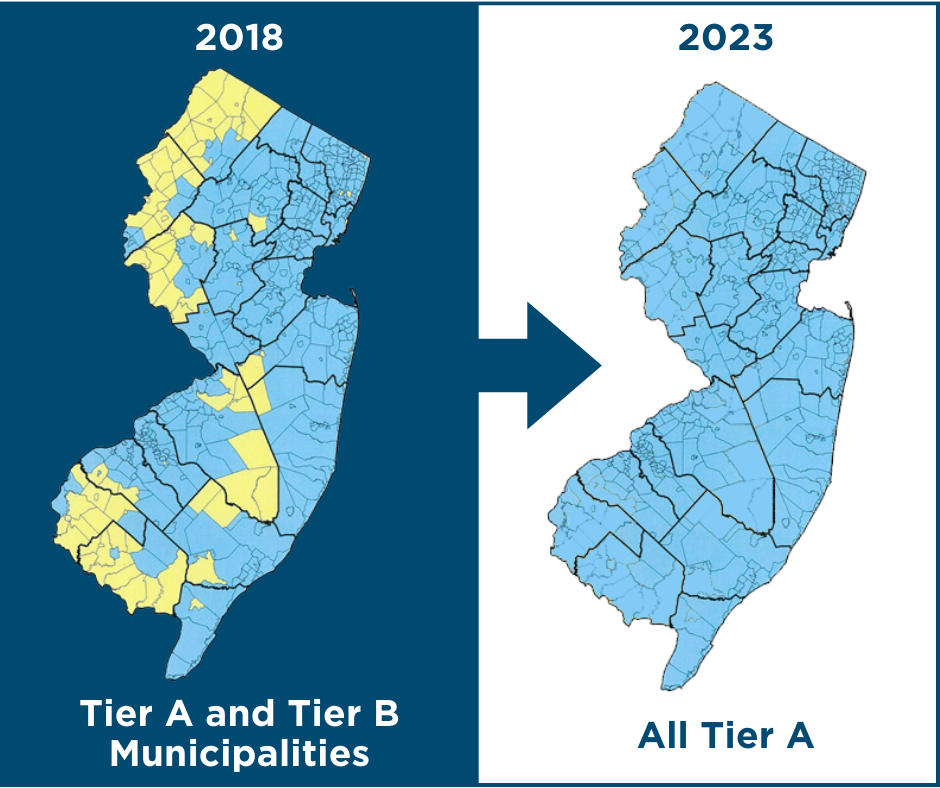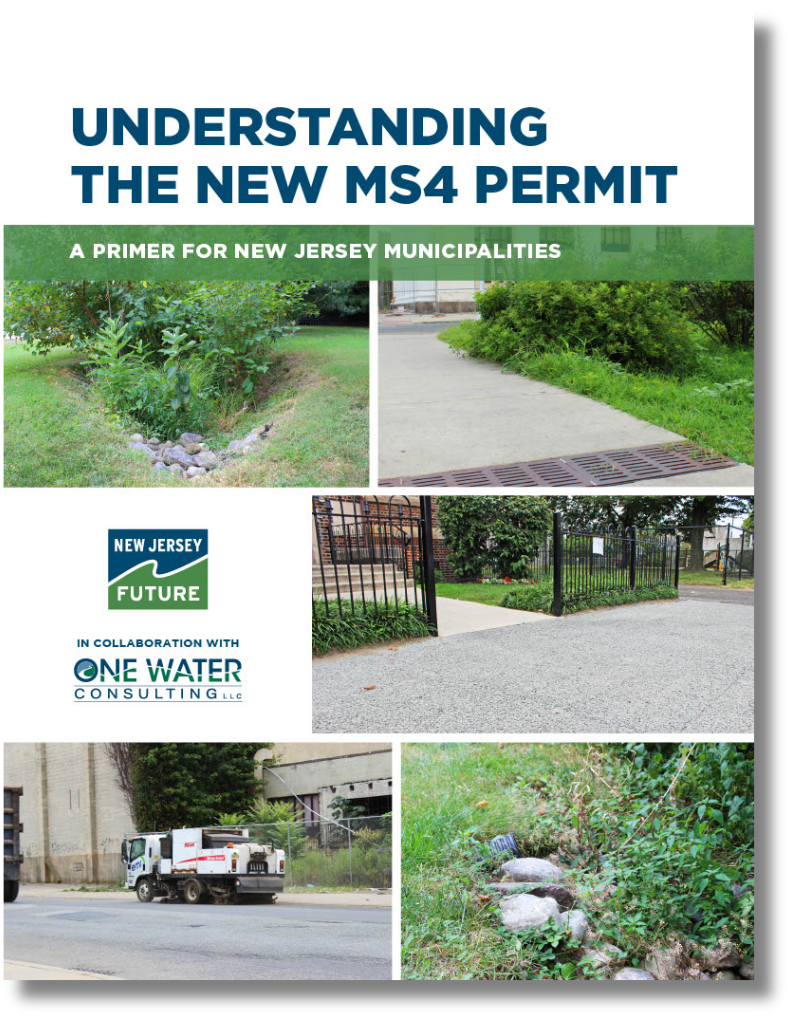NJ Stormwater Rule Overview
The New Jersey Department of Environmental Protection (NJDEP) has published a revised set of stormwater regulations that will affect land development practices within the state. The revisions require the use of decentralized green infrastructure practices and provide a more objective review process for projects. The new rule amendments took effect March 2, 2021.
Previous regulations required the use of nonstructural stormwater management strategies to “the maximum extent practicable.” The new rules eliminate this subjective language and instead provide a clearly articulated, mathematically-based set of standards for stormwater design compliance.
A second, but equally important, component to the new rule is the change in permitted stormwater modeling criteria. Infiltration of captured stormwater through best management practices (BMPs) is now permitted in engineering calculations. This change will result in smaller stormwater BMPs, thus maximizing developable area on a site.
Beyond the use of green infrastructure and the impact of receiving credit for stormwater infiltration, the rules introduce additional changes that will impact development. Guidance is provided on both small and large scale BMPs. New tables clarify the applicability of different BMPs when used to meet the requirements for groundwater recharge, water quality, and quantity standards. Additional engineering calculation methods relevant to green stormwater infrastructure design are also incorporated.
In order to assist design professionals in selecting the right BMPs to meet these standards, the new rule separates BMPs into three (3) tables:
Table 5-1 consists of green infrastructure BMPs that can be used to meet water quality, water quantity, and groundwater recharge requirements. Table 5.1 presents options for the use of local, decentralized green infrastructure in order to maximize treatment and groundwater recharge.
Table 5-2 consists of green infrastructure BMPs that can be used to meet water quantity standards. BMPs in this table provide alternatives for meeting water quantity requirements for larger sites. These BMPs cannot be used for water quality or groundwater recharge without a waiver/variance. When a development must meet all three (3) requirements, these systems can be used in conjunction with Table 5.1 BMPs.
Table 5-3 consists of structural systems and green infrastructure that may be used only with a waiver or variance.
Pending Changes
NJDEP’s Stormwater Management (SWM) rules at N.J.A.C. 7:8 are anticipated to be updated through the New Jersey Protecting Against Climate Threats (NJ PACT) Resilient Environments and Landscapes (REAL) land use regulatory reform. REAL was initially published in the New Jersey Register on August 5, 2024, with a follow-up notice of substantial change on adoption published on July 21, 2025. Public comments are reopened until September 19, 2025.
Stormwater Ordinance
Every NJ municipality must update its stormwater ordinance to comply with new amendments to the Stormwater Management Rules (NJAC 7:8). As of July 17, 2023, NJDEP’s Inland Flood Protection (IFP) Rule is effective. The IFP Rule requires stormwater Best Management Practices (BMPs) to be designed to manage runoff for both today’s storms and future storms. These changes will help ensure that stormwater infrastructure is built to withstand impacts of changing climate. Municipalities are required to update their local SCOs by July 16, 2024 to reflect these changes. This is a great opportunity for your community to evaluate their local ordinance for potential enhancements.
NJDEP provides a sample stormwater ordinance. New Jersey Future’s Enhanced Model Stormwater Ordinance, also available as an editable Word document, provides several options for municipalities to strengthen their ordinances to increase green infrastructure and reduce flood risk.
Local stormwater ordinances may impose stricter requirements than are found in the new state stormwater rule for certain kinds of projects. In the preamble to its new model stormwater ordinance, NJDEP specifies how. For example, municipalities may choose to define “major development” with a smaller area of disturbance and/or smaller area of regulated impervious cover or regulated motor vehicle surface; apply stormwater requirements to both major and minor development; and/or require groundwater recharge, when feasible, in urban redevelopment areas. See our Update and Improve Ordinances section for more.
Tier A MS4 Permit
Upgrading and retrofitting New Jersey’s stormwater infrastructure and reducing impervious cover is a key way to address nonpoint source pollution. Stormwater Best Management Practices (BMPs), including green infrastructure, are an integral part of both improving the quality of New Jersey’s lakes, rivers, streams, and bays and reducing dangerous flooding events worsened by climate change.
The new Tier A Municipal Separate Storm Sewer System (MS4) permit, effective January 1, 2023, reflects a shift toward watershed level planning to address water quality issues and flooding in order to better protect communities from the impacts of climate change. A significant change from the previous permit is the inclusion of the Watershed Improvement Plan (WIP) requirement, which is aimed to address nonpoint source pollution and identify water quality improvement projects.
Understanding the New MS4 Permit: A Primer for NJ Municipalities.
New Jersey Future and One Water Consulting, LLC created an MS4 Primer to help municipalities understand the recent changes to the MS4 Permit and address stormwater issues related to new and existing development. The MS4 Permit and this Primer provide a framework for water quality improvements and a regional approach to stormwater management in New Jersey.
Check out New Jersey Future’s MS4 Fact Sheet for an overview of changes from the 2018 Tier A MS4 Permit.

All towns previously considered Tier B, over 100 municipalities, have been reclassified as Tier A. This reclassification means all of New Jersey’s municipalities are subject to permitting obligations informed by federal regulations, which include more stringent requirements set forth in the Clean Water Act. -Check back here for future updates and resources.
Training
Proper training is important to ensure that successful green infrastructure is installed in your municipality. The following groups will benefit from training:
- Department of Public Works staff
- Municipal engineers
- Municipal planners
- Contractors and installers
- Maintainers
- As part of a municipality’s MS4 permit obligations, all municipal review engineers must complete NJDEP’s Stormwater Management Design Review Course within the last five years, and the Stormwater Management Rule Amendment Training if required. The MS4 permit includes additional training requirements including training for a dedicated Stormwater Program Coordinator (SPC) on staff, training for municipal staff and board members, and the creation of an employee training program for all individuals responsible for implementation of the stormwater program.
Sign up to receive updates on green infrastructure training opportunities
Resources
Understanding the New MS4 Permit: A Primer for NJ Municipalities
NJDEP Stormwater Rule FAQs
Developers Green Infrastructure Guide 2.0
New Jersey Future blog:
Sustainable and Cost-Efficient: Implementing a Dig-Once Policy in Trenton (August 2024)
Stormwater Pays No Mind to Municipal Borders—Why Should You? (July 2024)
Harmful Algal Blooms impacting recreation season for NJ Lakes (July 2024)
New NJDEP Watershed Improvement Plan Requirement and What This Means for Municipalities (January 2023)
